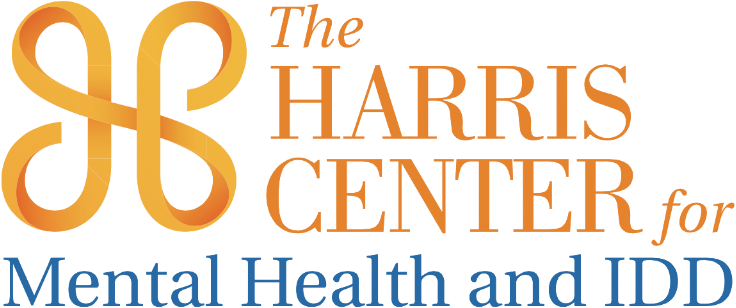
At The Harris Center for Mental Health and IDD, their steadfast commitment to trauma-informed care is uniquely positioned to assist people in Harris County coping with their individual traumatic events – whether it’s an accident, shooting or natural disaster. This includes the severe end of the trauma spectrum, Post-Traumatic Stress Disorder (PTSD).
Evelyn Urdiales Locklin, MA, LPC, Director, Emergency Services and Residential Programs, and Trauma Informed Care Implementation Team Lead at The Harris Center, serves as a knowledgeable guide in this complex landscape of trauma.
"Trauma is an emotional response to a terrible event. The immediate reactions usually entail shock and denial. As time passes, the responses evolve into unpredictable emotions, flashbacks, strained relationships, and even physical symptoms like headaches or nausea,” explains Locklin. "When you grapple with PTSD, it doesn't just disappear on its own," Locklin affirms. "It can be debilitating, and returning to a state of normalcy requires specific interventions. This type of help is readily available at The Harris Center."
This article provides insight to the nature of PTSD, its symptoms, and treatment options, offering a resourceful guide for those seeking care and understanding.
Understanding and Treating PTSD
Contrary to popular belief, PTSD doesn't exclusively impact veterans. Many traumatic situations can elicit symptoms similar to depression and anxiety, underlining the importance of trauma-informed care. PTSD originates from life-threatening or life-risking experiences, often associated with individuals who have survived assaults or witnessed horrific events. PTSD keeps individuals perpetually on high alert—a misfired survival mechanism.
According to the National Institute of Mental Health, to be officially diagnosed with PTSD, a person must experience the following symptoms for at least one month:
- At least one re-experiencing symptom
- At least one avoidance symptom
- At least two arousal and reactivity symptoms
- At least two cognition and mood symptoms
Not everyone who experiences a trauma has PTSD.
"No formula determines how a body will react to trauma," Locklin explains. "Every person is unique. No three individuals will experience a situation the same way. Trauma spans a giant spectrum. It's like a ‘choose your own adventure book,’ but without complete control over the outcome. That's where therapy and a supportive network, such as The Harris Center, can help navigate these challenging journeys.”
The Harris Center offers several evidence-based practices to help with treatment, including:
- SAMHSA Assertive Community Treatment (ACT)
- Cognitive Behavioral Therapy (CBT) and Cognitive Processing Therapy (CPT)
- SAMHSA Illness Management and Recovery (IMR)
- SAMHSA Integrated Treatment for Co-occurring Disorders
- SAMHSA Supported Employment and Permanent Supportive Housing
- Screening, Brief Intervention, and Referral to Treatment (SBIRT) model
- Motivational Interviewing
- Person-Centered Recovery Planning
- Seeking Safety
PTSD affects approximately 7% of the population and more women than men. However, not everyone exposed to traumatic events develops PTSD. Resilience and personal history significantly influence an individual's response to trauma.
“Sometimes people don’t even realize they’ve experienced trauma,” says Locklin. “The Adverse Childhood Experience Study identified ten potential traumatic events in childhood (Age 0-17). If you endorse a high ACE score, it may help identify and acknowledge the potential roots of trauma. ACEs are not destiny—a high score does not equate to poor functioning—there are corresponding protective factors which may minimize the impact of the traumatic experience(s). At The Harris Center, we can provide support and resources. The healing is going to happen through connection and being able to trust people.”
Locklin suggests reviewing the CDC-Kaiser ACE Study, which has a questionnaire to provide insight on child abuse and neglect, household challenges, and other socio-behavioral factors. The questionnaires are not copyrighted, and it’s free to do. ACEs may impact physical as well as mental health.
How do you Cope with Trauma?: Identifying Survival Skills
Within the context of PTSD, trauma-related experiences can induce symptoms that closely resemble those found in individuals grappling with depression and anxiety disorders. They may encounter overwhelming feelings of sadness, persistent hopelessness, impaired concentration, alterations in appetite or sleep patterns, as well as profound worry and fear.
“Survival skills often appear as symptoms in individuals grappling with trauma. These adaptations to life may include avoidance or self-medication, among other coping mechanisms,” explains Locklin.
Although not always healthy, these adaptations show how the body tries to endure after trauma.
"At The Harris Center, our goal is to help people identify their coping mechanisms, honor them, and suggest healthier alternatives," Locklin shares. "Healing begins by building trust. We understand that those who come to us may not immediately open up due to past hurtful experiences. That’s why building trust and establishing an authentic rapport over time is crucial."
People sense genuine care. The Harris Center aims to foster deep connections with the people they serve, meeting them where they are, and guiding them toward their vision of a happier life. They offer top-quality services at reduced rates, ensuring licensed therapists are available regardless of the individual's ability to pay. They also collaborate with community partners to assist with housing and other essentials, helping individuals navigate overwhelming processes.
Trauma-Informed Care: Creating Safe Spaces
The cornerstone of trauma-informed care at The Harris Center is providing a physically and psychologically safe environment.
“We're here to support those in need—no judgment, no sugarcoating. We work towards meeting basic needs first, then establish connections to compassionate, empathetic, non-judgmental support, crucial in any healing journey,” says Locklin.
In trauma-informed care, The Harris Center helps people better understand themselves and uncover layers they hadn't considered before. This approach centers on safety, collaboration, voice, choice, and transparency. They lead their recovery at their own pace.
“It isn't just a checklist—it's a paradigm shift, a fresh perspective, acknowledging that we're all doing our best with what we have,” explains Locklin.
After all, recognizing that you need help is often the first step… and the hardest one to take.
“Just like any medical condition, PTSD requires professional intervention—it won't disappear on its own. Healing only happens through relationships,” says Locklin. “As a society, we need to break that stigma. You wouldn’t wait out a physical health condition, like a heart attack, and you shouldn’t wait on your mental health either. The more we can incorporate mental and physical health care, we can work together to treat people as a whole.”




